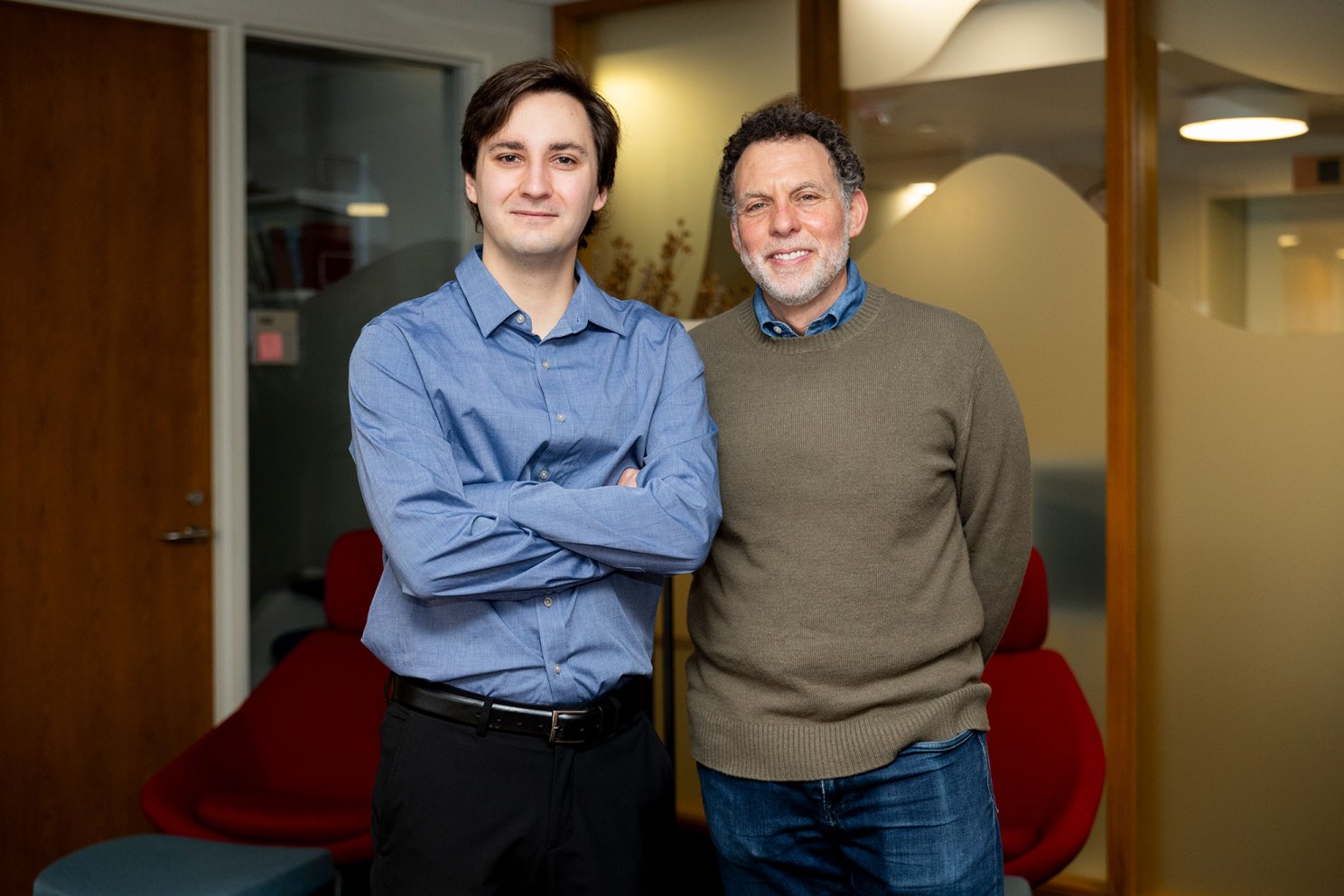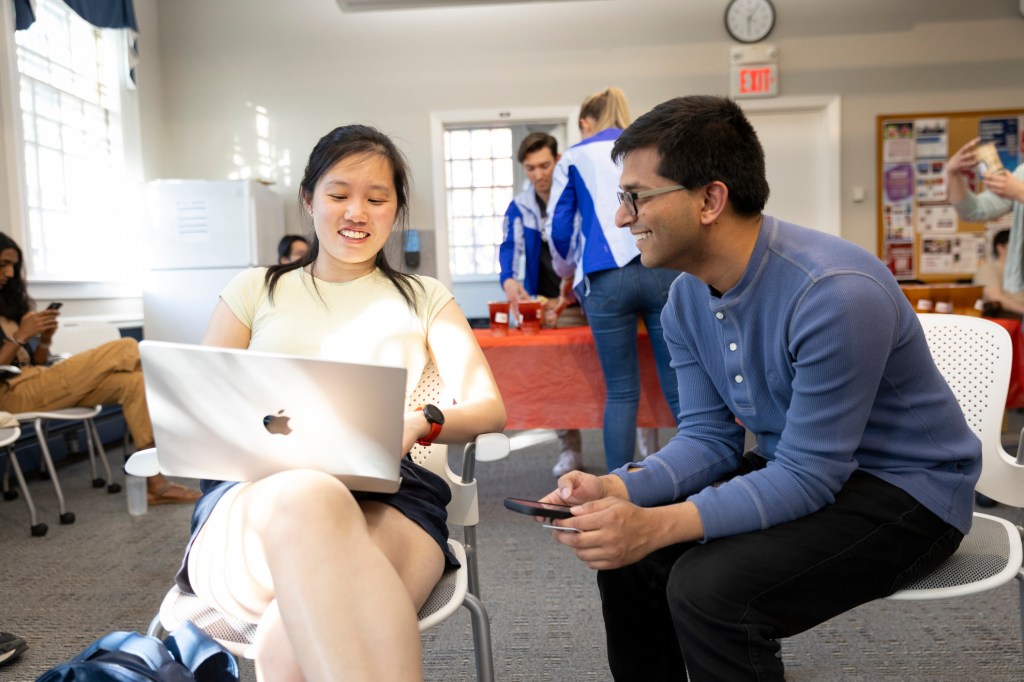Social media fueled divisions. Teaming up may help heal.

Ph.D. candidate Lucas Woodley, the paper’s lead author (left), with Professor of Psychology Joshua D. Greene.
Photo by Dylan Goodman
Study finds pairing members of opposing parties on the same side to compete in specially designed quiz eases partisanship
Algorithm-driven digital feeds have deepened the split between red and blue America. But a new online tool may help bring the country back together.
The virtual quiz game Tango, developed at Harvard, pairs Democrats and Republicans on common teams, where bipartisanship quickly emerges as a competitive advantage. “It’s really the opposite of the nasty, divisive posting you find on social media,” offered Tango co-creator Joshua D. Greene ’97, a professor of psychology and co-author of new study measuring the game’s impact.
The results, published this week in the journal Nature Human Behaviour, showed decreased negative partisanship, increased warmth, and even financial generosity between U.S. players from opposing parties. The effect was comparable, the authors wrote, to rolling back approximately 15 years of rising polarization in American political life.
What’s more, the changes persisted long after just one hour of play.
“We see over and over again that the effects last at least a month and often up to four months from playing just once,” reported Greene, whose research partners include current and former Kenneth C. Griffin Graduate School of Arts and Sciences students.
“We see over and over again that the effects last at least a month and often up to four months from playing just once.”
Joshua D. Greene

Students Shira Li (left) and Shlok Goyal playing Tango at a special event in the Graduate Student Lounge in Lehman Hall.
Niles Singer/Harvard Staff Photographer
Greene’s interest in intergroup conflict began with the publication of “Moral Tribes: Emotion, Reason, and the Gap Between Us and Them” (2013).
“I was happy with the book,” he recalled. “But it was very philosophical and offered little practical guidance for real-world problem-solving. For me, that provoked a kind of reckoning about how to spend my time.”
The experimental psychologist, neuroscientist, and philosopher soon found himself returning to core principles in both the life and social sciences.
“They were pointing in the same direction,” he said. “That is, everything is really about mutually beneficial cooperation. Molecules come together to form cells; cells form more complicated cells and colonies and creatures with organs that cooperate. Individuals form societies and tribes and chiefdoms and nations and occasionally United Nations.
“At every single level,” Greene continued, “the reason the world isn’t just primordial soup is because parts can come together to form wholes that can accomplish more together than they can separately.”
But how to move Americans toward this evolutionary sweet spot?
Former graduate student Evan DeFilippis, M.A ’19, M.B.A. ’22, was enlisted to help dream up solutions that were more scalable and a lot more fun than the standard dialogue circle. Later joining the project team were Shankar Ravi, M.Ed. ’22, a data/software specialist in Greene’s lab, and Lucas Woodley ’23, a Ph.D. candidate studying psychology and the new paper’s lead author.
As an undergraduate economics and psychology concentrator, Woodley got interested in conflict resolution after taking a Gen Ed course taught by Harvard Medical School’s Daniel Shapiro. Woodley and a few classmates went on to author a book on negotiation, featuring a free, hands-on curriculum for faculty and students.
“People reached out to say, ‘Hey, I tried out this exercise in my class, and it worked really well — the students had a lot of fun.’ But it was always on such a small scale,” Woodley said. “As I was thinking ‘Wouldn’t it be nice to have an intervention that was much more scalable while still keeping that element of enjoyment?’ I was applying to graduate schools and ran into Josh.”
With the help of the Washington, D.C.-based Global Development Incubator, the Tango project team engineered a platform that presents players across the U.S. with three rounds of trivia. Field-testing has yielded a set of questions that reliably reveal partisan knowledge gaps. Some cover cultural terrain, advantaging either Democrats (“Who are the main characters from ‘Stranger Things’ on Netflix?”) or Republicans (“Name the family from ‘Duck Dynasty.’”).
Other questions are crafted to affirm or challenge partisan beliefs. For example, Americans on the left are more likely to know that immigrants in the U.S. commit relatively few crimes. Right-leaning players know relatively few gun deaths involve assault-style weapons.
“We build in uncomfortable truths for both sides. People still left us comments saying they want to play again.”
Lucas Woodley
“We build in uncomfortable truths for both sides,” Woodley said. “People still left us comments saying they want to play again.”
Throughout, two-person teams rely on Tango’s chat function to coordinate answers. As Woodley pointed out, this invites debate as well as mini-celebrations of a partner’s contributions. “That seems to be what makes the game so effective,” he said.
The academic paper represents five randomized controlled trials based on nearly 5,000 U.S. players who were recruited online. In one of the experiments, Democrats and Republicans were given $100 to allot as they like. Those who had teamed up with a political rival proved far more generous with members of the opposing party.
Eventually, the Tango team hopes for regularly scheduled sessions where Americans at large can join in for game night at letstango.org. Woodley also envisions bar-goers encountering Tango at the local watering hole. But for now, they’ve cooked up other creative ways of distributing a game that requires simultaneity.
With support from the President’s Building Bridges Fund, Woodley partnered this spring with undergraduate Houses and a GSAS student group to stage a two-hour Tango event. The project team has already reached thousands of undergraduates via rollouts on other U.S. campuses and recently wrapped up its first trial with employees at a Fortune 500 company.
“A lot of business leaders feel like they’re being forced to pick sides — and they just want to sell a product,” said Greene, who envisions for-profit entities incentivizing Tango one day via coupons and other customer perks.
As polarization surges globally, the team is also at work customizing Tango for a variety of national contexts. Pilot testing is underway in Israel, with questions for India and Northern Ireland in the works.
Constructive dialogue is still a critical intervention in these divided societies, Greene said. “But what makes dialogue even possible is that basic sense of mutual respect and openness — of thinking ‘this person is on my team.’
“So, what we’re trying to do with this game is expand the definition of ‘us,’” he added. “It’s less like two smart humans having a debate about immigration and more like two chimps picking bugs out of each other’s fur.”





